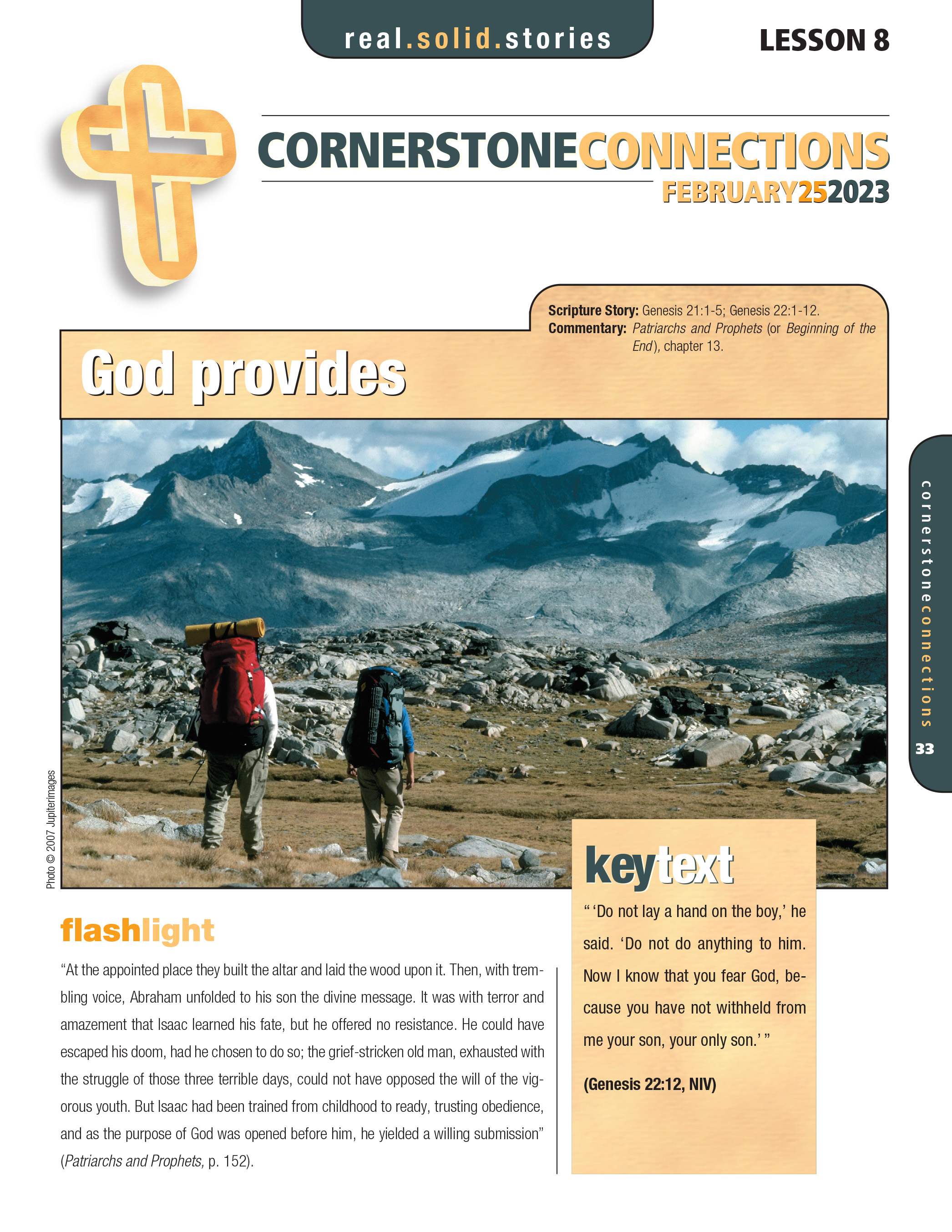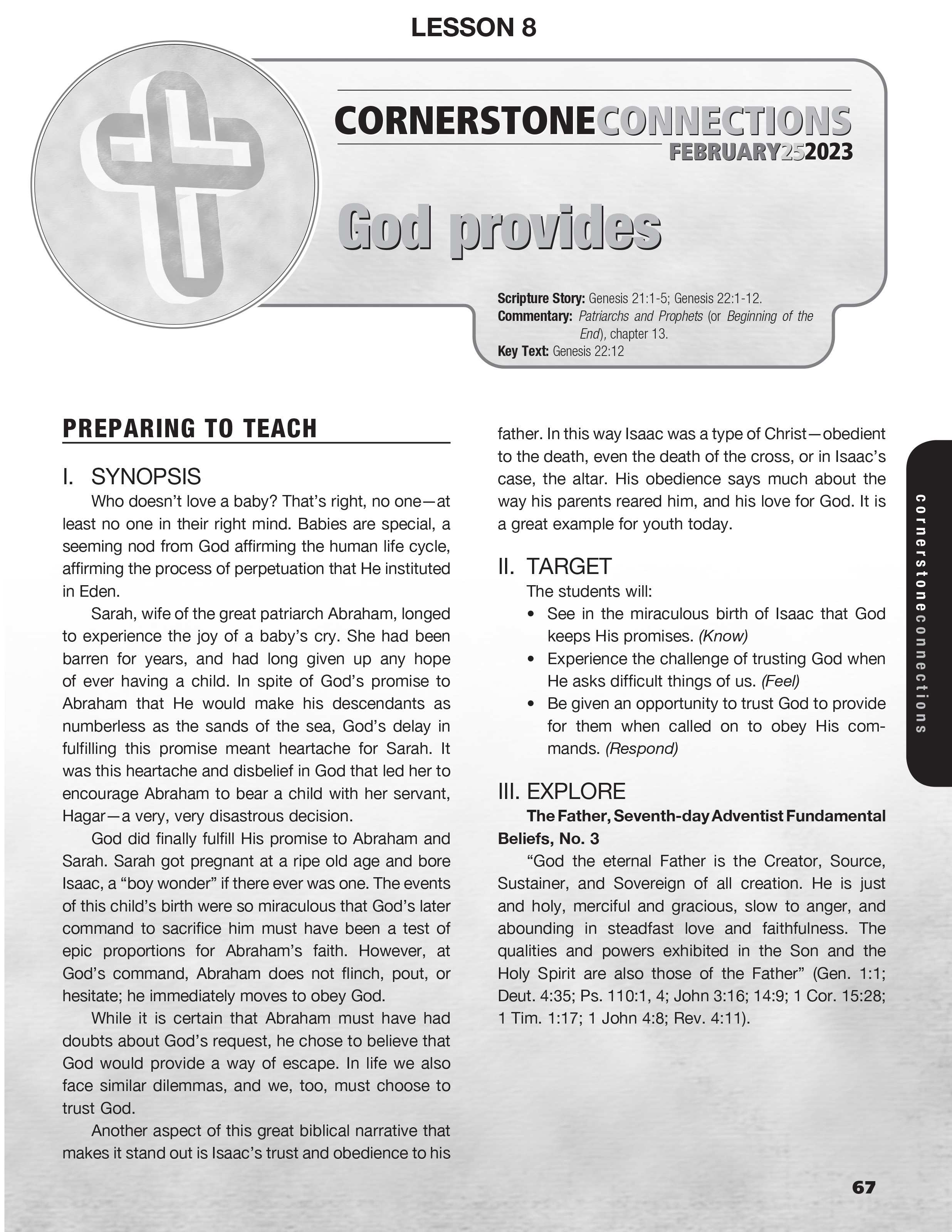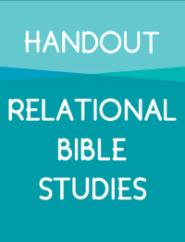God Provides
Click below to download the Cornerstone Connections leader’s guide and student lesson. This week’s resources also include two lesson plans and a discussion starter video which offer different ways of looking at the topic. Each lesson plan includes opening activities, scripture passages, discussion questions, and real-life applications.
The story of the miraculous birth of Isaac is the story of how God keeps His promises even when the most enlightened human reasoning pronounces the situation hopeless and impossible.
Scripture Passages
OVERVIEW
You have an inner voice that carries on an almost constant conversation within you. Sometimes the voice is discouraging with comments like, “What were you thinking, you are so bad.” While other times, it cheers you on, “You did it, that was amazing!” Your inner voice can sometimes be heavy with emotional, sad or happy thoughts that affect your perspective in negative or positive ways. The best messages that can possibly come from within you are those that have your faith and hope in God as their source. As this week’s lesson focuses on the story of Abraham and Isaac’s journey to make a sacrifice, we can learn a very real lesson about the difference between making decisions based on our faith versus our feelings.

OPENING ACTIVITY: WHAT IS YOUR FACE SAYING?
Play a game in which the students take turns making facial expressions, while others guess what they are expressing. Divide up into groups of four people each. Within each pod of four, have them take turns guessing each other’s expressions. Discuss how God made His people to have emotions. Emotions are not bad, but they can wreck your life if you let them control you.
DISCUSSION
BIBLE STUDY GUIDE
Read each Bible passage, then discuss the questions.
Noah’s Faith
Read Genesis 6:17-22 (NIV).
17 I am going to bring floodwaters on the earth to destroy all life under the heavens, every creature that has the breath of life in it. Everything on earth will perish. 18 But I will establish my covenant with you, and you will enter the ark—you and your sons and your wife and your sons’ wives with you. 19 You are to bring into the ark two of all living creatures, male and female, to keep them alive with you. 20 Two of every kind of bird, of every kind of animal and of every kind of creature that moves along the ground will come to you to be kept alive. 21 You are to take every kind of food that is to be eaten and store it away as food for you and for them.”
22 Noah did everything just as God commanded him.
DISCUSSION
Jonah’s Feelings
Read Jonah 4:1-3 (NIV).
But to Jonah this seemed very wrong, and he became angry. 2 He prayed to the Lord, “Isn’t this what I said, Lord, when I was still at home? That is what I tried to forestall by fleeing to Tarshish. I knew that you are a gracious and compassionate God, slow to anger and abounding in love, a God who relents from sending calamity. 3 Now, Lord, take away my life, for it is better for me to die than to live.”
DISCUSSION
Joseph’s Faith
Read Genesis 39:6-12 (NIV).
6 So Potiphar left everything he had in Joseph’s care; with Joseph in charge, he did not concern himself with anything except the food he ate.
Now Joseph was well-built and handsome, 7 and after a while his master’s wife took notice of Joseph and said, “Come to bed with me!”
8 But he refused. “With me in charge,” he told her, “my master does not concern himself with anything in the house; everything he owns he has entrusted to my care. 9 No one is greater in this house than I am. My master has withheld nothing from me except you, because you are his wife. How then could I do such a wicked thing and sin against God?” 10 And though she spoke to Joseph day after day, he refused to go to bed with her or even be with her.
11 One day he went into the house to attend to his duties, and none of the household servants was inside. 12 She caught him by his cloak and said, “Come to bed with me!” But he left his cloak in her hand and ran out of the house.
DISCUSSION

APPLICATIONS
Abraham loved his son Isaac very deeply, and he had feelings of fierce loyalty, care, and protection for him like what any parent has for their children. But, Abraham also knew the voice of God. It was only because he had strong faith in God that he was able to make the decision to go sacrifice Isaac. This was the opposite action of what his feelings would ever tell him to do.
FOLLOW UP
Consider applying what you learned in this week’s lesson by doing one or all of these activities:

SCRIPTURE PASSAGE
LEADER’S NOTE
For a Relational Bible Study (RBS) you’ll want to get into the Scripture passage and encourage the youth to imagine participating in the story while it’s happening. Then you will be able to better apply it to your own situation today.
You will need to ask God for the Holy Spirit to be present as your small group discusses the questions (no more than 3-6 people in a group is recommended). Start with the opening question. It is a personal question and the answer is unique for each individual. There is no right answer and nobody is an expert here, so don’t be surprised when you hear different responses. You are depending on the Holy Spirit to be present and to speak through your group. Say what God prompts you to say, and listen to what others share.
Take turns reading the chapter out loud. Follow that with giving the students some time to individually mark their responses to the questions (a PDF version of the handout is available as a download). This gives each person a starting point for responding when you start to share as a group. Next, begin the discussion by asking the students to share what they marked and why on each question as you work your way through. Feel free to take more time on some questions than others as discussion warrants.
Encourage each person in the group to apply what is discussed to their personal lives and to share with the group what they believe God wants them to do. Then ask them to pray that God will help each of them to follow through in doing so. Remind them to expect that God will show them ways to live out the message of this passage in the coming week, and that they are free to ask others in the group to help hold them accountable.
OVERVIEW
Not only the fact of Isaac’s birth was specified beforehand, but also the exact time. And now the long-anticipated child had arrived. This was proof of God’s gracious words of promise.
But, not long after, another trial of faith faced the patriarch. This command from God tested Abraham’s deepest heart motives and proved his ability to be true to God’s voice in the face of controversial human perception and understanding.
Could Abraham obey God in defiance of human logic, and yet cling to the promise that God would always be faithful to the covenant?
“Blessings Beyond”
Have you ever been tested, and after, felt a blessing beyond belief?
Read Genesis 21:1-5.
Now the Lord was gracious to Sarah as he had said, and the Lord did for Sarah what he had promised. 2 Sarah became pregnant and bore a son to Abraham in his old age, at the very time God had promised him. 3 Abraham gave the name Isaac to the son Sarah bore him. 4 When his son Isaac was eight days old, Abraham circumcised him, as God commanded him. 5 Abraham was a hundred years old when his son Isaac was born to him.
Read Genesis 22:1-12.
Some time later God tested Abraham. He said to him, “Abraham!”
“Here I am,” he replied.
2 Then God said, “Take your son, your only son, whom you love—Isaac—and go to the region of Moriah. Sacrifice him there as a burnt offering on a mountain I will show you.”
3 Early the next morning Abraham got up and loaded his donkey. He took with him two of his servants and his son Isaac. When he had cut enough wood for the burnt offering, he set out for the place God had told him about. 4 On the third day Abraham looked up and saw the place in the distance. 5 He said to his servants, “Stay here with the donkey while I and the boy go over there. We will worship and then we will come back to you.”
6 Abraham took the wood for the burnt offering and placed it on his son Isaac, and he himself carried the fire and the knife. As the two of them went on together, 7 Isaac spoke up and said to his father Abraham, “Father?”
“Yes, my son?” Abraham replied.
“The fire and wood are here,” Isaac said, “but where is the lamb for the burnt offering?”
8 Abraham answered, “God himself will provide the lamb for the burnt offering, my son.” And the two of them went on together.
9 When they reached the place God had told him about, Abraham built an altar there and arranged the wood on it. He bound his son Isaac and laid him on the altar, on top of the wood. 10 Then he reached out his hand and took the knife to slay his son. 11 But the angel of the Lord called out to him from heaven, “Abraham! Abraham!”
“Here I am,” he replied.
12 “Do not lay a hand on the boy,” he said. “Do not do anything to him. Now I know that you fear God, because you have not withheld from me your son, your only son.”
1. After reading Genesis 21:1-5, how would you describe the scene?
2. What was the promise God gave to Abraham and Sarah?
3. What is the meaning of Genesis 22:2?
4. What was the meaning of Abraham’s speech in Genesis 22:3-5?
5. What feelings come over you as you read Genesis 22:6-8?
6. In Genesis 22:9-12 what do you think was happening in Abraham and Isaac’s minds?
7. In what areas of your life do you still have faith issues?
8. What makes it hard to have faith in God?
SUMMARY
Few under the Old Testament were brought into the world with such expectations as Isaac. He was in this a type of Christ, that Seed which God so long promised, whose birth was long expected. He was born according to the promise, at the set time of which God had spoken. God’s promised mercies will certainly come at the time which He sets, and that is the best time. Isaac means “laughter,” and there was good reason for the name.
We never are secure from trials. To tempt, to try, or to prove, are expressed by the same word. Every trial is indeed a temptation, and tends to show the dispositions of the heart, whether holy or unholy. But God proved Abraham, not to draw him to sin, as Satan tempts. Strong faith is often visible through strong trials. The result of Abraham’s trust shows that blessings lie beyond belief. When we choose our faith over fear and feelings, we please God. This is the distinct aim of every child of God.

APPLICATION
It was not God’s intention that Isaac should actually be sacrificed, yet nobler blood than that of animals, in due time, was to be shed for sin, even the blood of the only begotten Son of God. But in the meantime, God would not in any case have human sacrifices used.
Below, find some application activities to interface with this lesson. These are simply to provide ideas for your use, or to invite you to imagine and create some of your own, as you impact the lives of teens for God’s glory.





